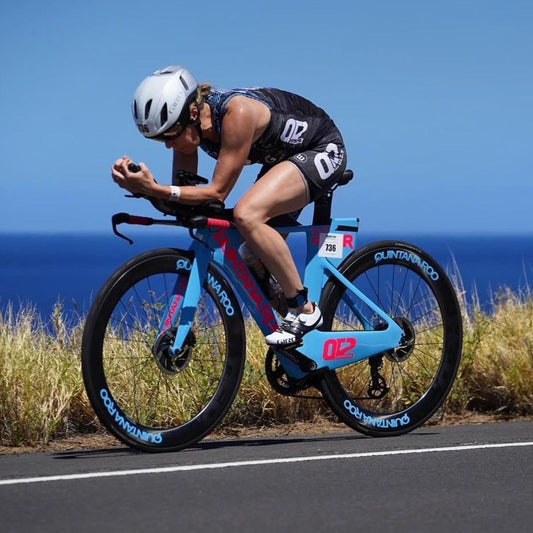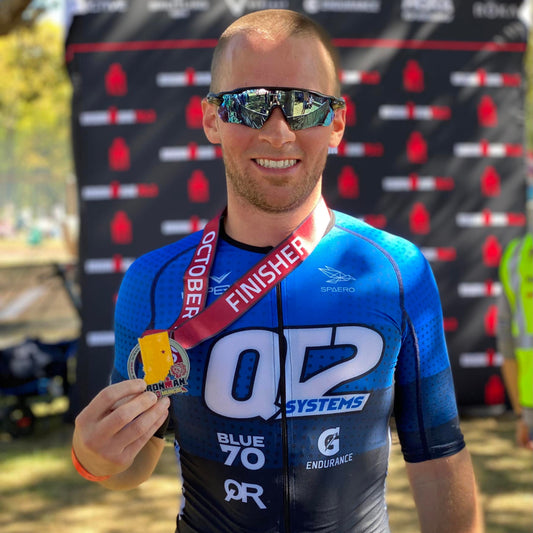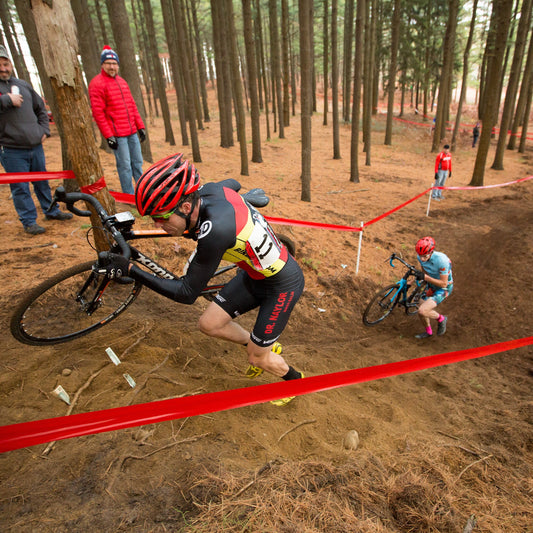
As a woman getting my PhD, I had plenty of doubts – most of all wondering if I really did belong there. Finding triathlon, however, was different. First, when I started in 2014, I had no idea what I was doing and that was a bit of a blessing in disguise, when you don’t know what you don’t know, it's hard to question it. Second, it was just for fun, a new hobby, and outlet for energy. Third, it turned out I was fairly good at it, the swim was hard, but I could make up for that on the bike and the run, of which especially the last came a lot more natural to me.
As I progressed to the 70.3 distance, and the realization came that I could compete at the top end of the age group field grew, the pressure did go up a bit. I was however still so new at all of this that the elements of joy and surprise outshone any doubts I had about myself.
Turning pro changed all of this. I love that I made the switch back in 2017, and I love racing in the pro field, that I have no doubt about. But the first few races were hard, especially mentally. All of a sudden I was no longer at the top end of the field, but I was somewhere in the back. The doubts that had followed me throughout my academic career came soaring back: “do I belong here”?
When in 2018 I did my first full Ironman and, in the months following, a couple more, placing top 5 for all of them, I all of a sudden was part of the competition and I felt like I had found my spot. Placing 3rd in two races solidified that for me in 2019. Yet, this also increased the pressure as people started knowing who I was. This pressure, probably mostly my internal pressure, did not dampen my drive to be better, to improve and get the most out of my body. If anything, it fueled it.
The more you find that edge though, the more you try to push your body to that line during training and racing, the more important each element becomes. Of course, I am talking about my mediocre swim, my somewhat inconsistent bike and my injury plagued run, but most of all I am talking about the mental game.
Training for triathlon is a multi-year process and throughout my years in the sport I have made significant improvements in all three sports. Being new at the sport, the initial improvements were large, but as I am getting more dialed in these jumps become smaller and smaller. With my coach, we continue to successfully push my speed on the run and power on the bike, but this year we also decided we needed to address some of the other gaps. To try something different for my swim I started working with a swim specific coach (Tim Floyd of Magnolia Masters). This however still left the most unaddressed part of training and racing: my head.
The mind is an interesting thing. With the amount of training I do, I know what my body can and should be able to do during training and usually I can hit all of those targets. Yet, when race day rolls around I all of a sudden doubt myself. It’s not every race, but it’s unpredictable and almost seems like the more prepared I am (and the fewer excuses I have) the more likely it rears its ugly head. This starts in the swim – which is a little harder to gauge as I’m in open water and trying to manage getting on the feet of other women – but I doubt my ability to maintain an effort I should have no issues with. Things like “maybe I can’t do this”, “the swim just isn’t my thing” and “the race is still long” start popping up, which then can turn into “maybe I should just back off and save it for the bike and run”. All of this, while knowing well that me pushing it hard on the swim is very unlikely to translate to fatigue on the bike and run. Yet that negative self-talk, once it starts, is persistent.
I love the bike – I can ride it all day during training and ride it well. Yet, it also happens on the bike and it is worse on flatter courses with fewer distractions and where my power numbers are more directly reflecting my effort. “This is not my type of course”, “maybe its just not there today”, “just back off a bit, the run is still coming”. An added issue here is that the run tends to be where I shine – I rely on that run. I should know from training that I run well off the bike, but there is always that little voice in the back of my head that wants to make sure that run is actually there. And 5 hours is a long time to argue with the voices, back and forth, from “I know I can hit these numbers” to “its ok, just back off”, back and forth..
Once I get to the run its different, this is where my body knows what to do. Or does it? I have confidence in my run. I know what it should feel like, I know what paces I can hit, I know how to push myself without breaking. And when I race well, I can run really well. But here comes the kicker – when I continuously fight myself during the swim and the bike, I exhaust myself mentally. By the time that run rolls around, I just have nothing left. There is no push, no extra give. And if I don’t run the run I know I can run, I feel like I bombed the race. Which likely just means my whole race was somewhat mediocre. But I do not want my race to be mediocre, I want to showcase what I have been training for and I want to compete with the best.
All of this happened during my only Ironman in 2020, where I was excited to finally be able to race at IM Florida, but where it just did not come together. It again made me doubt my belonging and it has gotten me nervous about this upcoming season. Which adds more (internal) pressure and with that more doubt.
This is something I am actively working on, myself and with a sports psychologist. Most of this consists of a few things (in no particular order):
#1 is finding strategies that help me avoid the negative spiral. The thoughts of self-doubt will be there, but it is about how I deal with them. Do I listen to them and go into battle, or do I accept that these thoughts are there, acknowledge them and them put them to the side and refocus on my task at hand? I need to trust the training and my body and not let the little voice of evil impede that confidence and sway my focus.
#2 is find training strategies to boost my confidence. The increased work on my swim will hopefully build some confidence there, though this might be more of a long-term strategy and might not be quite ready this season. For the bike this might mean ride a long ride at race wattage and race-pace run off of that. This might mean finding a long flat course and train on maintaining my aero position (and focus). This might mean picking a low steaks race in which I go harder on the bike than I think I can handle and see how long I can maintain that before I blow up (or if I do get through, see how the run goes) – this is one that is a lot harder said than done as my subconscious self really struggles with this.
#3 is focus, focus, focus. Train and race with purpose. Be intentional and deliberate. Pick something to focus on every training session and practice staying on target. Learn to realize when I lose focus and bring my attention back. This is something I want to keep working on to improve my racing.
All of these are still very much a work in progress, but I feel good about putting in the effort to getting closer to my best self.
This post was written by QT2 Level 1 Coach, Lenny Ramsey.





